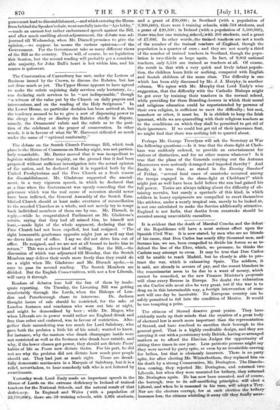The debate on the Scotch Church Patronage Bill, which took
place in the House of Commons on Monday night, was not particu- larly remarkable. Mr. Baxter moved that it was inexpedient to legislate without further inquiry, on the ground that it had been proposed without sufficient investigation into the actual opinion of the nation, and he declared that it is regarded both by the United Presbyterians and the Free Church as a fresh reason for disestablishment. Mr. Gladstone supported the amend- inent, in a very vigorous speech, in which he declared that at a time when the Government was openly conceding that the grievance which was the real cause of secession should never have been inflicted, the General Assembly of the Scotch Esta- blished Church should at least make overtures of reconciliation to the seceded Churches as a whole, and not merely try to tempt back individual members of them one by one. Mr. Disraeli, in reply,—while he congratulated Parliament on Mr. Gladstone's return, saying that they had all missed him, he himself not least,—made light of the whole argument, declaring that the Free Church had not been expelled, but had resigned. " The right honourable gentleman opposite might just as well say that we drove him out of office. I say we did not drive him out of office. He resigned, and we are not at all bound to invite him to return." This was a clever kind of trifling. But the Bill,—the discussion of which was adjourned till Monday, that the Scotch Members may deliver their souls more freely than they could do on a- night when Mr. Gladstone and Mr. Disraeli spoke,—is sure to pass its second reading. The Scotch Members are di;iided. But the English Conservatives, with not a few Liberals, will carry it through.


































 Previous page
Previous page